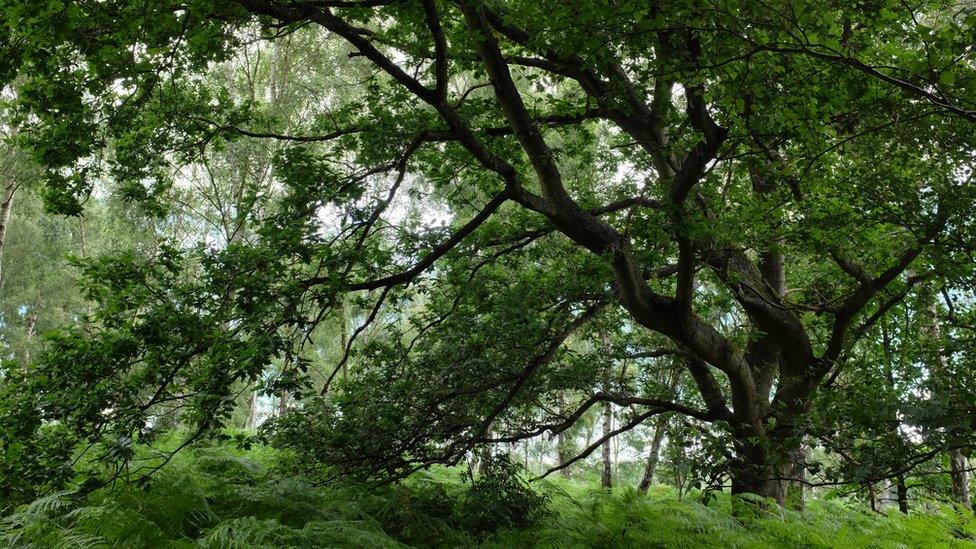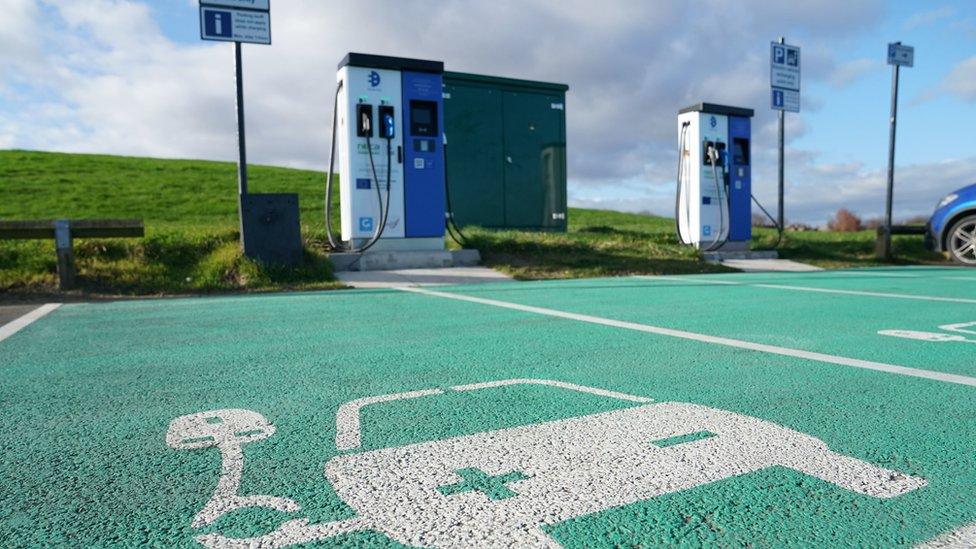Climate change: Will competing NI bills cause political wrangle?
- Published

Edwin Poots says a net-zero emissions target will hit the incomes of farmers
It took exactly 57 seconds for a piece of climate history to be made at Stormont this week.
That was how long was required to introduce Northern Ireland's first climate bill for assembly consideration.
The so-called first reading is a technical step in the legislative process.
It is when the bill is introduced, its title is read out and it is ordered to be published.
But while its introduction may have been dry, its journey through the law-making process will be more eventful.
And having been the only part of the UK without its own climate legislation, Northern Ireland could well end up with two competing climate bills in the coming months.
How much carbon to cut?
There is now consensus that legislation is needed.
It was a commitment in the New Decade, New Approach agreement which restored the Stormont institutions in January last year.
But politicians differ on how far and how fast Northern Ireland needs to be going.
What is climate change?
On one side are Sinn Féin, the Ulster Unionists, the SDLP and the Alliance Party, which all back the private member's bill introduced this week by Green Party leader Clare Bailey.
It calls for net-zero carbon emissions in Northern Ireland by 2045.
On the other is the Democratic Unionist Party (DUP), especially its Agriculture and Environment Minister Edwin Poots.
He is drawing up his own departmental bill and has proposals ready for approval by the Stormont executive when he can get them on to the agenda.
That bill is likely to draw on advice from the UK's climate advisory body the Committee on Climate Change (CCC).
It suggested an 82% cut in emissions by 2050 would be a fair contribution for Northern Ireland to the UK's net-zero climate commitment.
Net zero means driving down carbon emissions as far as possible and using carbon storing like tree planting, peatland restoration and carbon capture technology to offset the rest.
The farmyard dilemma
Emissions reductions targets will be difficult for Northern Ireland because of one thing - cows.
They belch out methane and it is a potent greenhouse gas, though experts differ on the calculation of its warming effect.

The planting of trees is one way of offsetting carbon emissions
Methane make up the bulk of Northern Ireland's agricultural emissions and agriculture produces 27% of Northern Ireland's total emissions.
It is the region's biggest-emitting sector.
But Northern Ireland is also economically reliant on agriculture.
There are 24,000 family farms, agri-food supports 100,000 jobs and Northern Ireland is export orientated, feeding up to 10 million people in Great Britain.
That was the reason the CCC suggested an 82% cut rather than net zero for Northern Ireland.
And that is how this debate is likely to be framed.
Mr Poots has already been critical of the private member's bill, saying it could reduce livestock numbers and hit farm incomes.

Cattle produce methane which makes up much of the emissions in the farming sector
He has called the legislation rushed and ill-conceived.
Its supporters say it is considered and creates a legislative framework, not specific targets for individual sectors like agriculture.
The policies needed to deliver on the overall 2045 target will be left to departments to design.
They believe their bill forced Mr Poots' hand.
Consensus or conflict?
So what happens if the minister's bill does indeed follow the private member's bill on to the assembly floor?
That situation is unprecedented and no-one is really sure of the answer.
Meet Belfast's young climate change protesters (filmed in 2019)
Assuming the departmental legislation moves forward, might there be enough consensus to merge the two bills?
Could the private member's bill be amended to make it more palatable to opponents?
Would there be the numbers and the political will to use assembly voting mechanisms to kill it and concentrate on the departmental one?
Whatever happens the direction of travel appears set - a climate bill is coming.
And there are political as well as economic considerations.
It would not be a good look for Northern Ireland to still be wrangling about all of that as the UK prepares to host COP26 in Glasgow this November, the global climate conference which aims to commit world leaders to the emissions cuts required to deliver on the promise of the 2015 Paris Agreement.
Related topics
- Published23 March 2021

- Published22 March 2021

